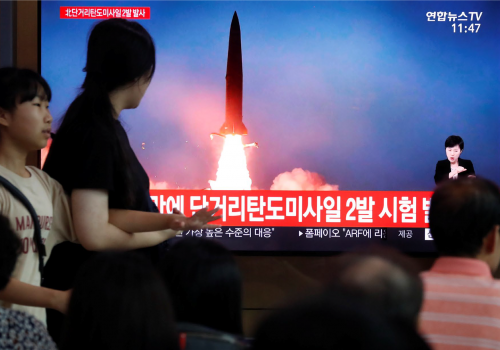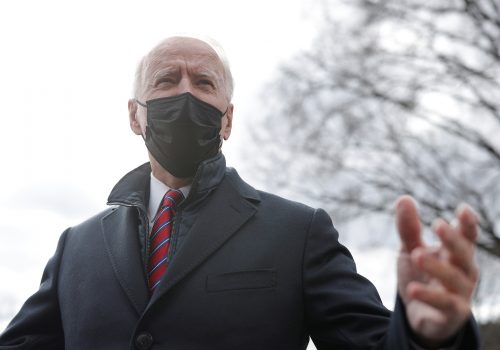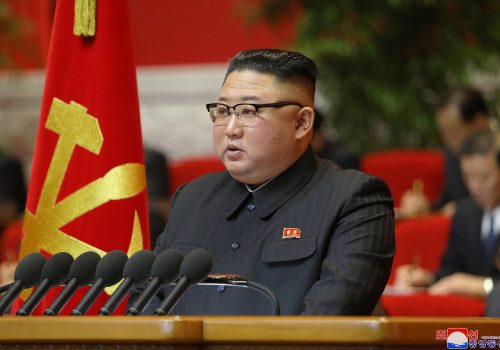FAST THINKING: North Korean missiles are back
JUST IN
First came the firing of cruise missiles, which Joe Biden dismissed with a laugh as nothing new. Now comes the launch of ballistic missiles—decidedly less of a laughing matter. North Korea never waits long to greet a new US president with a challenge, and Biden now has his in the form of projectiles landing off the coast of Japan. What does it all mean? We checked in with Markus Garlauskas, who in June departed his post as America’s top intelligence officer for North Korea analysis.
TODAY’S EXPERT REACTION COURTESY OF
- Markus Garlauskas (@Mister_G_2): Former National Intelligence Officer for North Korea and nonresident senior fellow at the Scowcroft Center’s Asia Security Initiative
Reading betwen the launches
- Markus tells us that “unlike this weekend’s launches—which were reported by US and South Korean officials to be of anti-ship cruise missiles—the latest launches would be a significant escalation” by North Korea even though they were reportedly short-range missiles. Keep in mind, he advises, that “ballistic-missile launches by North Korea, regardless of size or range, have been proscribed by a series of UN Security Council resolutions for well over a decade.”
- Also keep straight what these are and aren’t, he adds: “These launches are not a cry for attention [from Pyongyang], nor are they a cry for help with North Korea’s broken economy. Such launches are a sign of North Korea’s clear determination to continue advancing its ballistic-missile programs as part of making good on the ambitious plans for North Korea’s weapons programs that Kim Jong Un announced at the January party congress.”
- And the assumption that “smaller, shorter-ranged ballistic missiles” are “non-nuclear threats” isn’t necessarily true anymore, he says. Kim “announced in January that North Korea had ‘already accumulated nuclear technology’ to ‘miniaturize, lighten, and standardize nuclear weapons’ to allow for tactical nuclear weapons.’” Translation, courtesy of Markus: “Even smaller North Korean ballistic missiles are nuclear-capable if you take Kim Jong Un at his word.”
What happens next doesn’t just depend on North Korea
- The world gets a vote in what North Korea does next, Markus says: “If these [launches] go unchecked by the international community, this is likely to lead to launches of bigger and more capable systems, including those capable of carrying multiple nuclear warheads.”
- By incrementally escalating his provocations, Kim can “probe for responses from Beijing and the Biden administration while minimizing the risk that he triggers an unexpectedly strong response,” Markus explains. If there is no substantial response to Kim’s tests of shorter-range systems, that would also reinforce the precedent of such launches “being accepted by the international community without any costs to Pyongyang at all.”
- There are limits to the costs that the United States and its allies can exact. “Efforts to reinvigorate sanctions-enforcement and law-enforcement actions against North Korean illicit activity in general are very unlikely to get Kim Jong Un to stop in his tracks,” Markus concedes. But imposing some costs after each test will at least influence Pyongyang’s “cost-benefit calculus for the next one.”
Further reading
Thu, Mar 4, 2021
It’s time to get serious about a pressure strategy to contain North Korea
Issue Brief By Andrea R. Mihailescu
A Biden administration North Korea Strategy should continue dialogue with Kim's government, backed by a variety of pressure and enforcement tactics, in order to strive for the goal of arms reduction.
Tue, Feb 2, 2021
Three possible futures for the Biden presidency
New Atlanticist By Mathew Burrows, Robert A. Manning
Biden’s successes or failures will be determined by how the paradoxes of his presidency play out. The president is pursuing an extraordinarily ambitious social, economic, and foreign-policy agenda amid an exceptionally dire pandemic and recession—and with a razor-thin congressional majority, no less. He hopes to restore comity and bipartisan compromise to Congress, but his legislative skills will be tested by an obstinate Republican Party and worsening political tribalism.
Wed, Jan 13, 2021
FAST THINKING: What we’re watching in North Korea
Fast Thinking By
As Americans were preoccupied with violence at the US Capitol, officials in Pyongyang articulated their national-security strategy.
Image: Kim Jong Un, North Korea's leader, attends a meeting with Nguyen Thi Kim Ngan, chairwoman of Vietnam's National Assembly, at the National Assembly in Hanoi, Vietnam, on Friday, March 1, 2019. SeongJoon Cho/Pool via Reuters/File Photo


